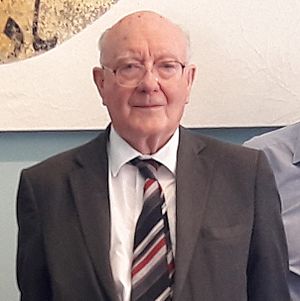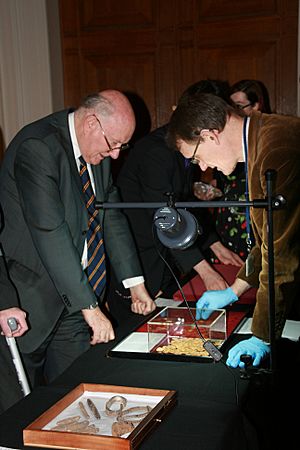Colin Renfrew facts for kids
Quick facts for kids
The Lord Renfrew of Kaimsthorn
FBA FSA HonFSAScot
|
|
|---|---|

Renfrew in 2018
|
|
| Master of Jesus College, Cambridge | |
| In office 1986–1996 |
|
| Preceded by | Sir Alan Cottrell |
| Succeeded by | David Crighton |
| Disney Professor of Archaeology University of Cambridge |
|
| In office 1981–2004 |
|
| Preceded by | Glyn Daniel |
| Succeeded by | Graeme Barker |
| Personal details | |
| Born |
Andrew Colin Renfrew
25 July 1937 Stockton-on-Tees, England |
| Died | 24 November 2024 (aged 87) Cambridge, England |
| Political party | Conservative |
| Education | St Albans School, Hertfordshire |
| Alma mater | St John's College, Cambridge |
| Military service | |
| Allegiance | |
| Branch/service | |
| Years of service | 1956–1958 |
Andrew Colin Renfrew, Baron Renfrew of Kaimsthorn (1937–2024) was a famous British archaeologist. He was also a paleolinguist, which means he studied the history of languages. He was known for his important work on radiocarbon dating, the early history of languages, and archaeogenetics. He also worked to stop the looting of ancient sites.
Renfrew was a professor of archaeology at the University of Cambridge. He also led the McDonald Institute for Archaeological Research. He was a very important person in the world of archaeology.
Contents
Early Life and Education
Andrew Colin Renfrew went to St Albans School in England. From 1956 to 1958, he served in the Royal Air Force. This was called National Service, where young people served in the military.
After his service, he went to St John's College, Cambridge. He first studied natural sciences, then switched to Archaeology and Anthropology. He finished his degree in 1962. In 1965, he earned his PhD. His research was about ancient cultures in the Cyclades islands in Greece.
Academic Career
In 1965, Renfrew became a lecturer at the University of Sheffield. He led digs in Sitagroi, Greece, between 1968 and 1970. He also became a Fellow of the Society of Antiquaries of London.
In 1972, Renfrew became a professor at the University of Southampton. There, he led more excavations. These included digs at Quanterness in Scotland and Phylakopi in Greece.
The Radiocarbon Revolution
In 1973, Renfrew wrote an important book called Before Civilisation: The Radiocarbon Revolution and Prehistoric Europe. In this book, he challenged an old idea. Many people thought that new ideas in ancient times always started in the Near East and then spread to Europe.
Renfrew used radiocarbon dating to show that Europe had its own early developments. This method helps scientists find the age of ancient objects. His work changed how archaeologists understood early European history.
Language and Archaeology
In 1981, Renfrew became the Disney Professorship of Archaeology at the University of Cambridge. He held this position until he retired. In 1990, he helped start the McDonald Institute for Archaeological Research.
In 1987, he published another key book, Archaeology and Language: The Puzzle of the Indo-European Origins. This book explored where the Proto-Indo-European languages came from. These are the ancient languages that many modern European and Asian languages developed from.
The Anatolian Hypothesis
Renfrew developed the "Anatolian hypothesis". This idea suggests that the Proto-Indo-European language started about 9,000 years ago in Anatolia (modern-day Turkey). He believed it spread as farming spread across Europe and the Mediterranean.
This idea was different from the "Kurgan hypothesis". That theory said the language spread from a migration of people from the Pontic–Caspian steppe about 6,000 years ago. Renfrew's work offered a new way to think about how languages spread.
Understanding the Ancient Mind
Renfrew also explored how ancient people thought. His work helped create a field called evolutionary cognitive archaeology. This field uses archaeological finds to understand the minds of early humans.
He and his student, Lambros Malafouris, even created the term neuroarchaeology. This describes the study of the ancient mind through archaeology. In 1996, Renfrew also talked about the "sapient paradox." This is the puzzle of why there was a long time between when modern humans appeared and when they developed complex behaviors.
From 1986 to 1997, Renfrew was the Master of Jesus College, Cambridge. He retired from his professorship in 2004. He continued to be involved in archaeological research until his death in 2024.
Awards and Honors
Colin Renfrew received many awards and honors for his work:
- He became a Fellow of the British Academy in 1980.
- In 1991, he was made a life peer. This meant he became a member of the House of Lords as Baron Renfrew of Kaimsthorn.
- He was made a Foreign Associate of the National Academy of Sciences in the USA in 1996.
- He won the Balzan Prize for Prehistoric Archaeology in 2004.
- He received honorary degrees from many universities around the world.
See also
 In Spanish: Colin Renfrew para niños
In Spanish: Colin Renfrew para niños
- Anatolian hypothesis
- Neuroarchaeology
- Evolutionary Cognitive Archaeology
 | Janet Taylor Pickett |
 | Synthia Saint James |
 | Howardena Pindell |
 | Faith Ringgold |


